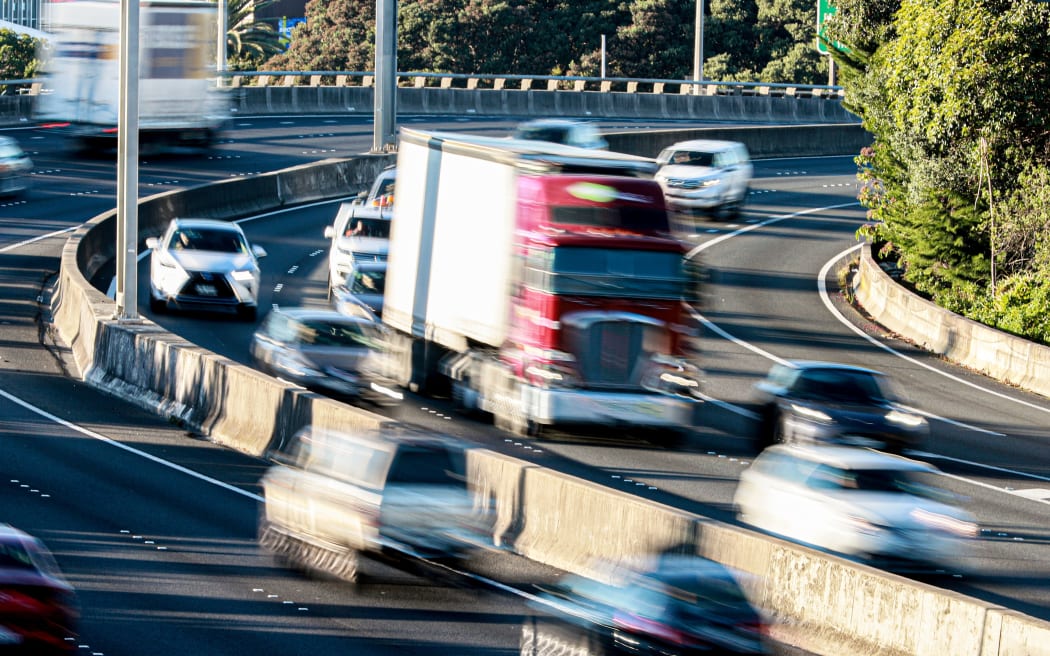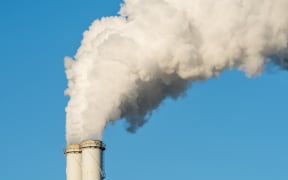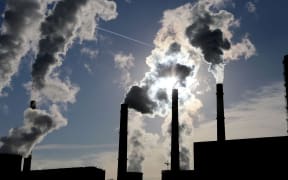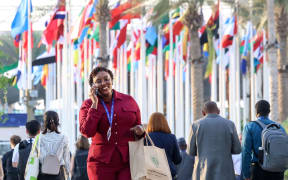
According to Treasury, New Zealand will need to spend billions on projects cutting emissions in other countries to make up for what the Climate Change Commission says was a late start to cutting greenhouse gases at home. Photo: RNZ / Marika Khabazi
New Zealand has been criticised by non-profit group Climate Action Tracker in its annual report on climate action.
Along with Japan and South Korea, New Zealand was singled out for its heavy reliance on buying carbon offsets from overseas.
New Zealand diplomats are at the COP28 climate summit in Dubai, debating the rules for making these deals.
Talks over carbon trading between nations have had a rather low profile at this year's summit, relative to issues such as whether to "phase out" or "phase down" fossil fuels, and finance for countries hit by climate change.
But the emerging rules governing international carbon trading are critical to New Zealand.
According to Treasury, New Zealand is going to need to spend billions on projects cutting emissions in other countries, to make up for what the Climate Change Commission says was a late start to cutting greenhouse gases at home.
New Zealand is not the only one shopping for credits on the international market - Switzerland and others are already cutting deals.
But with about two-thirds of our 2030 target expected to come from overseas, NZ is unusually reliant on trading.
Non-profit watchdog Carbon Markets Watch global markets expert Gilles Dufrasne has been following the negotiations.
The message to countries like New Zealand was to only use credits as a short-term gap-filler, not a substitute for cutting our own emissions, he said. Trading credits should not be seen as a long-term strategy, he said.
International trading could encompass almost any kind of action, he said, from cutting emissions from rice paddies to electric buses, to planting trees or adding solar farms.
Whether or not it includes promising not to do something - to not exploit oil reserves, or cut down trees, for example - is a matter of hot debate.
Under the rules, countries will need to show the climate benefits are truly additional to what the host country was doing anyway - for example, that a project wouldn't be financed without carbon credits, and that the country's laws don't require the action to happen anyway.
Under the Paris Agreement, there are two ways to trade credits: two-way deals between countries, or buying from a centralised global market supervised by the United Nations.
The global market is not yet operating, but bilateral deals are possible now.
Dufrasne said the global market would be more stringent, with requirements for projects to be signed off by the host country and registered with a UN body.
There will be a built-in complaints mechanism, so environmental groups or indigenous people in the host country can complain if a project has damaging effects.
With bilateral deals "it's up to the buyer to say that they want this thing," he said.
It was crucial New Zealand wrote its own safeguards into any deals, making sure they were transparent, genuine, and did not trample on indigenous rights, he said.
Official briefings show New Zealand has been exploring partnerships, despite nothing being sealed.
There's also a separate voluntary carbon market, for companies wanting to make claims that a product or business is carbon neutral or lower-carbon.
Toitu Envirocare chief scientist Belinda Mathers said it was not clear yet how these fit with the country's rules.
While two countries cannot count the same project towards meeting their national targets, she said it was less clear what happened when a private company paid for credits.
Rules against so-called double counting are a feature of discussions, but it is not yet settled whether they apply to companies making claims about their products outside of the Paris Agreement.
Mathers said businesses at the summit wanted certainty, but it was too soon to say how much would be achieved before it ends next week.
Climate minister Simon Watts flies to the summit today, and said he would be monitoring carbon market negotiations along with other negotiations in which New Zealand had an interest.







